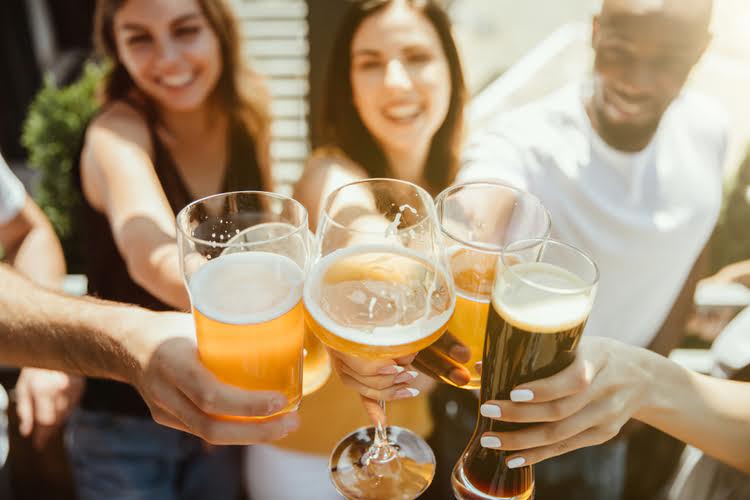Contents
When entering a relationship with a person in recovery, you must be willing to work with and accept the issues they deal with. While these past mistakes or mental health conditions should not be deal-breakers, they must not be ignored either. If it’s still within the first year, make it clear that your sobriety has to be a priority. The right person will understand, and it’s important for them to be aware of potential triggers andhealthy boundaries.
Take the relationship very, very slowly, particularly if they are in the early stages of recovery. If someone supports them and actively participates, there are more incentives to maintain their sobriety. You should ask your partner to be upfront about these issues in the first place so that you can assess your own tolerance levels and not be left in the dark. Knowing how much they are comfortable sharing is better so you aren’t surprised later. Stress and conflict can be triggers for those who are abstaining from alcohol, so finding a way to maintain the peace and in turn minimize those urges, helps.
They have psychiatric nurses, psychologists and psychiatrists. On this page you will find more information and useful links regarding mental health. No need to make their recovery harder than it has to be by putting them in situations that are troublesome. It takes time to heal from years of alcohol misuse, and you can’t expect someone who is in early recovery to focus their efforts on anything but improving.

The first few months of recovery are the most difficult. This is a time when drug cravings, sleeplessness, and dealing with emotions all make their presence felt. That’s why dating someone in recovery can be quite tough. Recovering alcoholic will require serious commitment and dedication, just like recovery. a synthetic derivative of the kudzu vine can Dating someone new should be fun and exciting, but when the person is an Alcoholic, it can make dating a bit more difficult. You want to be sure that you aid the person in their effort to get and stay clean without making them think that you are judging them or are worried that they may relapse.
Of course, these aren’t the only pieces of advice fordating someone in recovery. But these are a starting point and offer a good foundation on which to build a relationship. Though it may not always be simple to date someone in recovery, it’s something that can be done with patience and effort from both sides.
In other words, make sure to plan healthy, sober activities and dates. It’s simple to overlook our personal issues in favor of these pleasant emotions. That is why, more than any other question, this one is so crucial for both your future partner and yourself. Some people in recovery may want their partner to take an active role in their recovery activities, while others may prefer to keep it private at first.
Notice that in the addicted person, almost no energy or attention is available to engage in friendship or true intimacy. Denial, shown by the expanded unknown, has overtaken true intimacy. Friendship has been lost to the shallow associations with acquaintances based on the addiction. The thick lines indicate the barriers to friendship and intimacy which are caused by the expansion of denial and addicted activities. Hundreds of recovering people stay sober, become honest with themselves and others, make amends, and live within spiritual principles. Yet many of them are not able to have full, satisfying, close relationships.
Why Starting a New Relationship is Often Discouraged in Early Recovery
Open, honest communication is the only way to work on trust issues. Plenty of recovering addicts has gone on to experience loving, fulfilling the most important things you can do to help an alcoholic romantic relationships. Supportive partners have been found, marriages have been mended, and some stories have had happy endings after all.

Early in recovery, relationships are one of the leading causes of relapse. Although the Big Book of AA doesn’t offer guidelines on dating in recovery, addiction counselors strongly advise waiting until a person has achieved one year of sobriety. If you are dating a recovering alcoholic who has relapsed, they require professional treatment. At Carolina Recovery Center, we provide only the most effective modalities of addiction treatment while ensuring that each patient is well cared for and supported.
Mental health
Carefully weigh the pros and cons and decide if the relationship is worth it for you. Get to know the person and make sure that they are fully committed to sobriety. For an addict, nothing is more important than the substance. The addict is driven bycravings for drugs or alcohol, and fulfilling that craving becomes the most important part of his or her life. Relationships that were once so important become neglected. The addict’s actions and choices are based on securing more of the substance, and he or she begins to show little concern for loved ones.
Your partner’s sobriety solely depends on their dedication to their recovery and the maintenance of their healthy coping mechanisms. This means that, without prioritizing their recovery, your partner could very well relapse. We know that professional rehabilitation programs are the finest option for recovering addicts to heal and maintain their sobriety. If your loved one isn’t enrolled in a treatment program, they should go to meetings like Alcoholics Anonymous or Narcotics Anonymous to continue their recovery process.
- It may surprise you to find out that you are dating someone who is in active recovery from alcohol misuse.
- There are many people who are triggered by sadness or anger, but there are other times where events or people can trigger someone to want to drink.
- I will, however, happily go to a concert or live event where there’s drinking because I have something else to entertain me.
It is a way that you can support their recovery without them even knowing it. Feb 26, 2021 Alcohol Intervention Recognizing the Behaviors of an Alcoholic If alcohol were the only problem, families would most likely not be as affected as they are. There would be no treatment centers and no addiction counselors. Planning for a future after alcoholism treatment is about growing and learning. The fewer expectations we set and the more we let the process unfold through professional guidance, the more positive and productive the outcome will be. It may be beneficial to first seek help for yourself and to explore reasons why you allow yourself to stay in the relationship if the alcohol user is unwilling to seek help.
Fentanyl Addiction Statistics for Orange County
Do you find yourself doing things merely to please your significant other? Don’t be afraid to take a step back and protect your sobriety above all else. Another tip for dating an alcoholic in recovery is understanding their triggers. There are all types of triggers, including sights, sounds, smells, situations, and more. While avoiding triggers is important, it’s impossible to stay away from all of them.
And although they work hard to maintain it, they don’t advertise it as boldly as others. It is integral to their identity, and they wear it as a badge of honor. But don’t waste each other’s time believing or hoping they will be cool with it one day. If they don’t want to be around you drunk, don’t go out with friends, get drunk, and then hit them up with the dreaded “you up?

An intervention is not about how to control the substance user; it is about how to let go of believing you can. People with Bipolar one disorder can become over-involved and, at times, obsessive with pleasurable activities. This can cause problems such as infidelity and prioritizing certain things while forgetting other things that should be important such as children, marriage, work, etc. Being dishonest to other family members and friends about how things are going with you and them.
But a healthy, loving relationship with a recovering addict is possible. And if you’re a recovering addict yourself, don’t despair. By following the right precautions, you can successfully navigate the world of dating and find a thriving, supportive relationship. Families often find it easier to digest a mental illness diagnosis over an alcohol or substance use disorder diagnosis. It is not uncommon for behaviors that lead to alcohol and drug addiction to be present prior to the introduction of drugs or alcohol. If you’ve decided to get into a relationship while in recovery, know that it’s going to be an uphill battle.
What Will You Need from Me to Support Your Recovery?
Deeper and more personal things are kept at this layer, and we are more selective about who we let in. More trust is neded in order to let someone in to this layer. Problems at home or at work are talked about in more detail, as well as our hopes and fears, plans for the future, and regrets about the past. At this alcoholic pancreatitis layer of intimacy, we are more likely to let our guard down and show parts of ourself that we are not so sure about. It feels good to be with friends, because with them it is safe to be ourselves. This sense of acceptance is very important in a friendship, and without it friendship is not really possible.
In healthy personal relationships, both people can rely on the other person for understanding, help, affection, and support. Each person’s presence adds something positive to the other’s life. As we know, professional recovery programs are the best way for addicts to heal and remain successful in recovery without relapsing. If your loved one isn’t actively enrolled in a program, they should be attending meetings like Alcoholics Anonymous or Narcotics Anonymous to continue their recovery journey. Relapse is always possible in recovery, and 40% to 60% of individuals in recovery will experience a relapse. Your partner should have a plan in place in case relapse occurs.
An intervention is not about how to control the substance user; it is about how to let go of believing you can.
These types of things may seem small to you, but could affect your partner greatly, so taking the time to ask could make a big difference in the relationship. Part of early recovery is learning how to have fun and meet new people while sober. Although bars may be off limits, there are plenty of other places to meet prospective partners, such as AA meetings, volunteer functions, self-help workshops and community events. By working your program, you will discover who you are and what you can bring to your relationships, rather than what you can get from them. Also, you should keep in mind that recovery from any addiction, including alcoholism, is a lifelong process.
You have to be your own best friend and supporter before you can effectively offer yourself to another. A partner can help with the acquisition and practice of new, positive coping skills. Our residential homes and treatment facilities are near the beach and offer a comfortable setting for rehabilitation. If you or a loved one needs help, contact Transformations By The Gulf to learn more about our recovery services. Transformations By The Gulf offers individualistic and holistic recovery services.